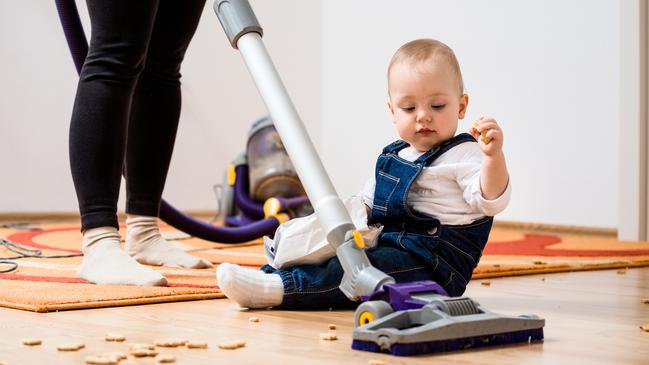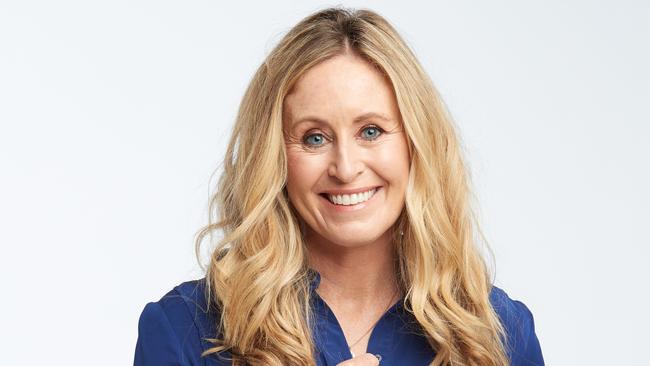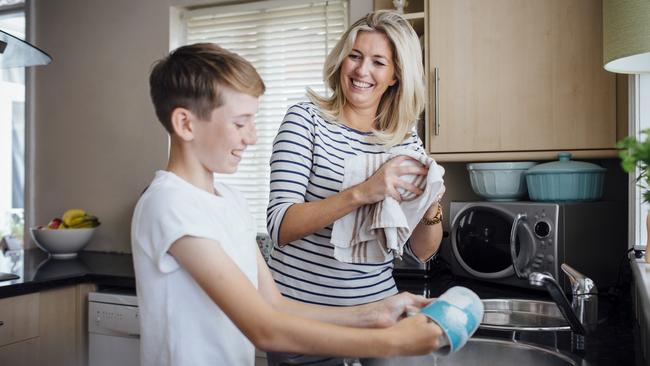Why are we shutting men out of the conversation?
If women want the balance of physical and emotional labour in the home to even out, we need to stop whingeing to our friends and start talking to the people we love the most, writes Angela Mollard.
There are stories women only tell each other.
Here are just three I’ve heard in the past few months. My friend and I are standing at her kitchen bench. Her husband has spent all morning gardening while, earlier, she did a huge supermarket shop and put on two loads of laundry. She’s making him a sandwich.
“Glad I got a Masters degree for this,” she quips. “He forgets to eat and then he gets angry with the kids. It’s just another thing I have to do.”
Another friend is sitting on a chair on her front veranda with her teenage daughter when I walk past. Her husband, she relays gleefully, has gone away for three weeks. “I’ve been counting down the days,” she reveals. “Now I don’t have to cook proper meals and we can all chill out.”
MORE FROM ANGELA MOLLARD: What is the secret to everlasting love?
A third is showing me a picture of her kids with their cousins at Christmas time. They’re playing in a swimming pool with two huge inflatables and nearby is a plate of sliced watermelon. Her husband is on a sun-bed in the background reading the newspaper.
“How’s that for a snapshot of our holiday,” she snarls. “I bought the toys for his nieces, I fed everybody and I even took the picture so we’d have some memories. Meanwhile, he’s the one actually having a break.”

Individually, these stories are amusing or dismaying depending on your point of view. Collectively, they have become the soundtrack to martyred motherhood, a movement which has pivoted from the despair of not being able to “have it all” to a new, freshly spun Zeitgeist affliction branded as “emotional labour”.
In short, emotional labour is the unpaid, often unnoticed work done by women that goes into keeping everyone comfortable and happy.
Well that’s what it says on the blurb of Gemma Hartley’s new book, Fed Up, and presumably what she will talk about at the All About Women forum at the Sydney Opera House on Sunday.
RELATED: Why I refuse to celebrate International Women’s Day
“Your male partner thinks he’s a legend for cooking dinner,” the program for the event says, “but who knows when the kids’ sports days are, or the dog’s immunisations are due; when the babysitter is coming, or who the babysitter even is? Women have shouldered domestic responsibility for too long and we’re fed up.”
While Hartley’s premise should not be dismissed — this is, after all, what women are talking about — I can’t understand why it’s being discussed in a forum which attracts largely a female audience. Sometimes it seems as if women put all their grievances in a blender, blast them to a pulp then hand them round to other women to drink.

You see, it’s eight years to the week since I wrote a similar article lamenting that I bore the brunt of “fadmin”, otherwise known as family administration. Back then my daughters were aged 10 and seven and I felt I’d crumple under the weight of household tasks. I concluded that having children could turn the most reconstructed couple into the most conventional.
“Before you know it,” I concluded, “one person is managing four lives while the other is saddled with the sole task of replacing a shaver in his lunch hour.”
RELATED: Let’s get the parity started
I wince reading that column now. What a martyr and a whinger. I’d anointed myself a victim and spent a good few years playing to the script.
But then I changed. While there were some external factors such as the gender pay gap and men’s biological inability to breastfeed that contributed to the lack of domestic equity (or emotional labour), there were a lot of internal factors that seemed to prevent women achieving household parity.
We’d become martyrs, acquiescing to a situation rather than deftly problem-solving our way out of it.

We were the most educated women in history yet we failed to use our intelligence and communication skills to workshop a solution with our partners. In many cases women became the “lead parent” while their partner became the “lead earner” simply by default because he earned more.
Yet conversations about purpose, responsibility, shared tasks and mutual happiness either didn’t happen or were only brought up in times of stress. I also noticed women, myself included, had a problem with control.
We thought we did tasks better and so we became domestic gatekeepers, shooing hapless husbands away because they didn’t do things how we wanted them done. They felt diminished yet we’d effectively robbed them of the chance to try.
MORE FROM ANGELA MOLLARD: Modern parenting isn’t working
Finally, I sought out men’s stories. I found they were terrified of redundancy and burdened by financial responsibility yet rarely spoke of it. When one man wrote anonymously in The Guardian in 2016 about wishing his wife would get a job because he wanted their marriage to be more of a partnership, the article drew 85,000 readers. It was not a view we’d heard before.
As for the stories above, women need to confide in their partners about their grievances.
There is no progress in claiming emotional labour as the next “feminist frontier”. Rather, communication is the bridge we need to cross if we’re to find a solution that benefits all.


